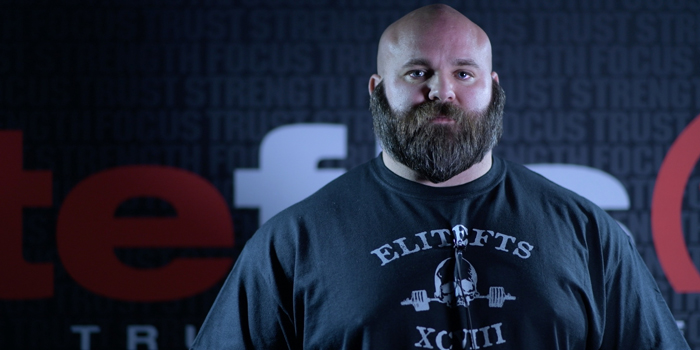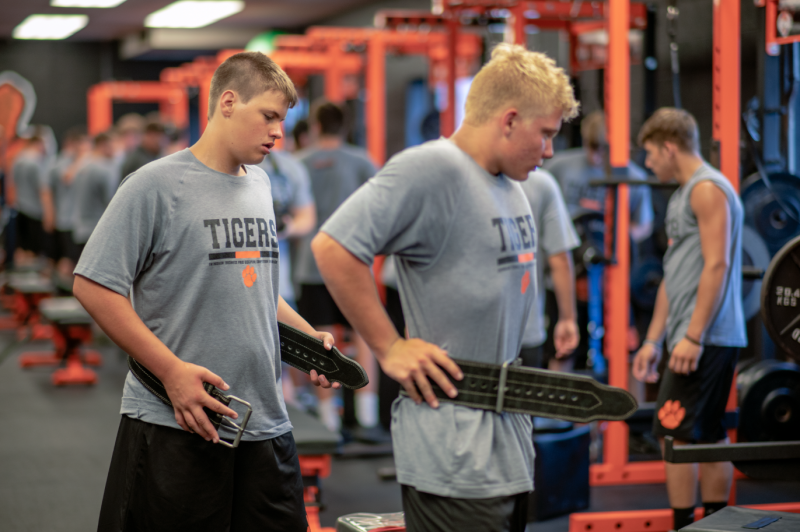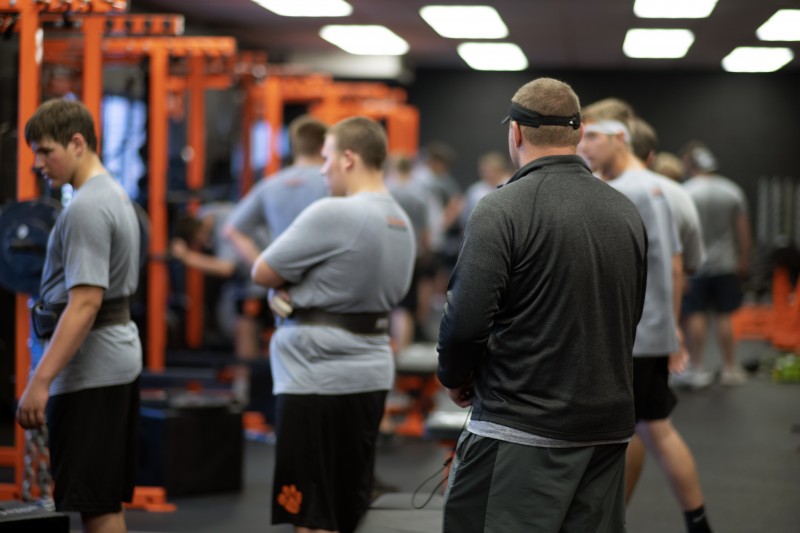
My first article on this topic dealt with getting your first job in strength and conditioning. Sorry to say, if you didn’t like what I said, some of those things are just facts. You have to go through a lot of crap to get one of these jobs most of the time, or at least one that is worth the trouble. What I want to address this time around are some of the untold truths about having this job and what it brings with it, both good and bad. Whenever I’m approached for a one-on-one conversation with an individual that is interested in doing this job, I make sure to sit them down and run through a whole list of criteria they will be asked to do and what they can expect not only in the interim but down the road as well. Here are some things to keep in mind when asking yourself if you want to be a collegiate strength and conditioning coach.
Disclaimer: What you are about to read does not reflect where I am today, my personal situations right now, or the institution I work for. I have a great job with great coaches and athletes I love to work with, right now. These are the norms and stories of myself and other coaches that might have come to pass.
1. This job does not carry a high average salary.
If you are thinking you are going to be rich and make all kinds of money being at the college level of strength and conditioning, you are mistaken. I will say that jobs for strength and conditioning coaches right out of grad school have an average salary range of $25,000 to $30,000. Now, there are higher paying positions out there and you might start higher, but this is the average. If you add full-time benefits, that’s like getting paid $35,000 to $40,000 per year. It’s nothing to sneer at, but it’s the truth. The national average salary for a director of football in strength and conditioning is about $52,000. For Olympics sports strength coaches it's about $51,000. These are both for the Division I level. You usually do not get that job straight out of grad school. Now, you have extreme outliers like anything else where you are making six figures at a some of the bigger colleges that carry more success, but it’s hard to get one of those jobs and they are fewer and far between.
RECENT: So You Want to Be A Collegiate Strength Coach: Steps to Earning Your First Coaching Job
Collegiate strength coaches do not do this job for money; it’s just not there most of the time. We do the job because we like working with athletes and seeing others succeed. Do you want to make some money? Be patient and work your way up by paying dues and kissing the right asses.
2. Strength coaches are at the bottom of the totem pole.
So you finally made it and have a job being a strength coach at a college or university. You might think, “Well, since I’m the strength coach, I will train the teams how I see fit, because that’s my job.” Yeah, good luck with that. At the end of the day, wins and losses are on the sport coach's shoulders and they will most of the time let you know that (especially the more narcissistic ones). Now, I always say that I work for the athletes and they are my first priority. And they are. But if you don't have a great relationship with your coaches, administration, and athletes, your chances of keeping your job are slim at best. Navigating these waters can be treacherous if you are always fighting the current. Sometimes you need to go with the flow. Most coaches are going to rely on your expertise and listen to your advice, but you need to also do the same and be open to changing your ways to fit the coach you are working with. It is their team and you need to embrace that. I will never put the athletes in harm’s way—that’s my cut-off—but I am open to hearing out the coach and designing a program that gets the ends they need without compromising the athlete.
Athletic trainers can also trump you if you do not keep a great working relationship with them. If an athlete is injured and the trainer wants to keep them out of the weight room, you don’t have a choice; they are gone. But if you have a great working relationship and they trust your ability to keep things progressing forward performance wise while the injury is being rehabbed, you will more than likely be able to keep that athlete in the weight room because you will have the trust of the trainer to do what is necessary. If that trust isn’t there, they can trump you, plain and simple. They can trump the coach when it comes to injury issues.
In summary, make sure you are working with the staff, not against them. Egos are aplenty; pick your battles.
3. No one knows what a strength coach really does, but they definitely know what you should be doing.
Everyone has an opinion. Everyone has an idea. Someone traveled overseas and spent time with some guru who does x, y, and z, so why don’t we do x, y, and z? Someone has spent time with the best professional team out there and they do this, why don’t we? Someone saw something on the internet, or knows a guy who charges $1,000 to come tell you how to eat Paleo, do yoga, train CrossFit, or do cryotherapy. If it costs $1,000 just to hear what the guy has to say, he must know what he's doing, right? Everyone is looking for the new edge and the reinvention of the wheel. Truth is, it doesn’t exist, and most everything out there that is “new” has been around for 20 years or more. Please, just stop it!
I say no one knows what we do, and what I mean by that is that they think all we do is lift heavy weight and make the athletes sore. Coaches usually think we aren’t doing sport-specific exercises for each sport out there:
- “Why are we squatting like football?”
- “I thought cleans were for football only?”
- "Why do we have to lift heavy?"
- "I don’t want to get to bulky!"
I could go one forever. Movements are movements, and no movement in the weight room is for one sport only. We are not here to just make athletes big and strong. One program does not fit everyone’s needs, but there might be a reason why everyone is doing the same thing at the same time. Opinions are like — well, you know how that saying goes. You will have questions and opinions and guru information thrown at you. Smile, listen, and don’t get too red-assed. They want the best for their athletes, as do you. Take it with a grain of salt and not as an attack on your training principles.
4. Vacation? What’s that?
What you will find out during internships and definitely graduate assistantships is that this job is seven days per week and 70 to 80 hours easily some weeks. You will come in before the sun rises and leave when it’s dark. I’ve had many days that I never saw the sun, literally. Depending upon the job you will be asked to travel at times, and that is still on-the-job stuff. I personally don’t like being stuck in a bus for eight hours on end. Your schedule will change last minute based on practices, facility usage, coaching changes to schedules, etc. You are expected to accommodate, and sometimes no matter what you will have to at a moment’s notice. It comes with the job. I was asked in an interview once, “How are you going to be able to work with everyone and get everything taken care of?” I said, "You just do. If it takes 80 hours and seven days each week, we will get it done." Keep this in mind when you think of the glory of being a strength coach and getting to live in a weight room for a living. You see how mechanics take care of their own cars, right? Trust me, that will be you at some point in time.
Honestly, there is more I could share in this article, but to sum things up: don’t expect to get rich, don’t expect respect at first (or ever), everyone will have an opinion and share it, and you will have no life! Remember, I said these were the untold truths. These are the things you need to know when considering taking up a job in coaching, especially as a strength coach. I don’t have to deal with the parent — that's a whole other section.
You still want this job? I do!













Seems odd that the national average assistant strength coach is $25,000-$30,000 when we have a masters degree and a certification. Yet, I would be willing to bet the national average for assistant sport coaches is $35,000-$40,000 with only a bachelors and no certification. Makes you wonder, doesn't it?
I disagree with the national average for director of football S&C. I've done research here and it is much higher, unless you're counting D1AA. I can provide you the numbers if you want them.
I do agree on the Football Strength salary being low but I'm also just being realistic that your not going to make 6 figures out the door or maybe never. Depending upon division, will depend upon your salary. Just want to get these individuals that think they will be making what Doyle or Cochran make, they are out of their F-ing minds!!
Collegiate S&C has a lot of issues right now, and if we continue turning a blind eye they will never get fixed and we will continue working for pennies while working 70, 80, or even 90 hour work weeks. Can you please explain to me what sense it makes to have a masters, a certification, work 80+ hours per week and only get paid $25-$30,000 per year while having your job dictated to you by someone who has an unrelated bachelors and no certification?
Salary and hours are just two of many issues we have going on right now.
Young coaches think collegiate s&c is a dream job. But it's actually really hard, hard to have a family, and hard to have any sort of life outside of the weight room. That is combined with a very low salary. Young coaches need to know these things before they get into a situation they regret.
Overall, salaries are trending up, and there are more positions available today than 5 years ago thanks to jobs being created on the Oly side, specifically with every major university hiring a "basketball only" guy. BUT there are still ALOT more coaches than there are jobs, so good luck.
With more positions being created and salaries going up, many coaches can now make livable wages AND have job security on the Olympic side, FCS, D2 and D3 level. As S&C we are standing on the shoulders of giants, and many coaches paved the way for this. The Al Vermeils, Joe Kenns, Boyd Epleys etc.
Just "another discouraging article" makes me laugh. This is the world you whiny ass people live in today. Ahh, boo hoo, "you make me not want this job or you are trying to discourage my dreams". Truly, if one persons opinion based on experience, alot of experience, discourages you then you didn't want it in the first place. I am truly sick on the cry baby BS I read, occasionally. This is the 2nd time I even looked at the comments cause truly, I don't care what people think. If I cared what people who I've never met said about me or judged me for something they know nothing of I would waste alot of my time and energy, something I'm doing right now. I just wasted 5 minutes of my life .